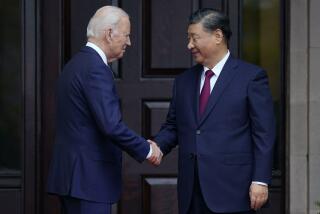THE WORLD - News from Oct. 16, 2009
BEIJING — Chinese Premier Wen Jiabao said Thursday that his nation was committed to deepening its ties with Iran, a declaration that underscores the difficulty the United States will face in seeking broad economic sanctions against Tehran in an effort to rein in its nuclear program.
“The Sino-Iranian relationship has witnessed rapid development, as the two countries’ leaders have had frequent exchanges, and cooperation in trade and energy has widened and deepened,” Wen said at a meeting in Beijing with visiting Iranian Vice President Mohammad Reza Rahimi, according to the official New China News Agency.
The U.S. and its allies are counting on China and Russia, veto-wielding members of the U.N. Security Council, for support in pressuring Iran to abandon activities the West fears could lead to the development of nuclear weapons.
But Washington is finding little support in either Moscow or Beijing. On Tuesday, during a visit to Moscow by U.S. Secretary of State Hillary Rodham Clinton, Russian Foreign Minister Sergei Lavrov said further sanctions on Iran would be “counterproductive.”
“We believe that at this stage all efforts must be focused on supporting the negotiating process,” Lavrov said.
President Obama disclosed last month that Iran was building a second uranium enrichment plant. Iranian officials say their nation’s nuclear program is for civilian energy purposes only, and Tehran has said it will allow United Nations inspectors to visit the facility.
But the United States, leading Western powers and Israel believe that the Islamic Republic’s ultimate aim is to develop nuclear weapons. The Security Council has imposed sanctions on Iran in each of the last three years on account of Tehran’s nuclear activities.
But undercutting hopes that China would take a tough stance on Iran now are the ever-growing economic ties between the two countries. More than 100 Chinese state firms operate in Iran, largely helping with infrastructure projects.
In the face of the sanctions already in place, two-way trade between China and Iran grew 35% last year, to $27 billion, according to irantracker.org.
More important, China has signed an estimated $120 billion worth of oil deals with Iran in the last five years to keep the world’s third-largest economy on a rapid growth path.
New punitive measures on Iran might drive up the price of oil for China, the world’s second-largest buyer of crude oil and a rapidly expanding consumer of automobiles.
Iran, for its part, needs China to help vitalize its oil and natural gas industries, which are underdeveloped because of the existing economic sanctions. Last year, the China National Petroleum Corp. signed a $1.76-billion deal with the National Iranian Oil Co. to tap Iran’s North Azadegan oil field, which is expected to produce 75,000 barrels a day by 2012.
In March, the two nations signed a $3.2-billion, three-year pact to develop the South Pars gas field beneath the Persian Gulf. Geologists say the underwater cavity may be the world’s largest source of natural gas. And in August, China signed a $3-billion deal to expand Iran’s Abadan and Persian Gulf refineries.
Because China has few oil reserves, it must go abroad to secure energy. Beijing often has little choice but to turn to volatile states such as Iran and Venezuela, because safer sources of oil have long been tapped by developed countries.
At the same time, China may have to balance its economic needs with maintaining a stable relationship with the U.S., especially now that Beijing would like to see itself as a bigger global player. Iran will be a key issue for Obama when he visits China in November.
Zhou Yongsheng, a professor at China Foreign Affairs University in Beijing, said China is in a difficult position.
“I think [Chinese officials’] decision is absolutely complicated by oil. They have to maintain good relationships with countries . . . where crude oil is produced.
“At the same time, the U.S. and Chinese relationship has reached new heights, and I think China will be willing to cooperate in many cases.”
--
More to Read
Sign up for Essential California
The most important California stories and recommendations in your inbox every morning.
You may occasionally receive promotional content from the Los Angeles Times.











